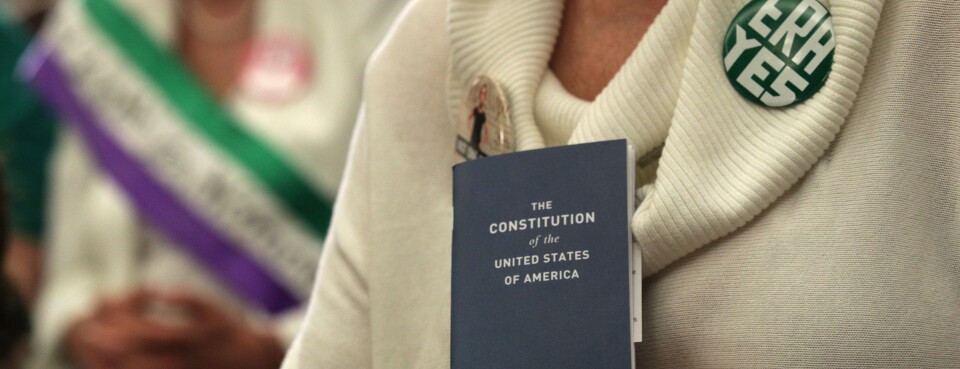
The threat of a Supreme Court ruling overturning Roe v. Wade has spurred a trio of new lawsuits seeking state court recognition of the Equal Rights Amendment—a last-minute effort to preempt that anti-Roe ruling by forcing the high court to factor new constitutional language into its decision.
The women’s rights group Elizabeth Cady Stanton Trust filed lawsuits in state courts in Michigan, Rhode Island, and New York, asking courts there to declare the ERA a fully ratified and enforceable part of the Constitution. The group sued each state’s attorney general, seeking to force the officials “to identify and repair all sex discriminatory laws, policies and programs” in their respective states.
The lawsuits open a new front in the wide-ranging battles over abortion rights and the Equal Rights Amendment. The recently leaked draft of a Supreme Court opinion in the pending case Dobbs v. Jackson Women’s Health Organization would end the court’s 50-year precedent of recognizing a constitutional right to abortion, if the court’s final majority opinion aligns with Justice Samuel Alito’s draft when it is published, likely next month.
“By declaring the ERA’s validity, this Court will prevent the Supreme Court from overruling Roe and protect women’s basic human right to control their own lives,” attorneys wrote in each of the three complaints, filed May 18 in Michigan and Rhode Island and May 19 in New York.
The Equal Rights Amendment doesn’t explicitly address abortion, but the plaintiffs said the amendment’s guarantee of equal protection under the law on the basis of sex would cover the right for women to make reproductive choices free from government interference.
Status Contested
The status of the amendment has been hotly disputed since January 2020 when the Virginia legislature voted to approve it, arguably becoming the 38th state to ratify and giving the measure approval from three-fourths of states—satisfying the Constitution’s amendment process.
Opponents argue the Virginia vote came decades too late, as did the ratifications by lawmakers in Nevada in 2017 and Illinois in 2018, because Congress had given states a seven-year deadline when it sent them the proposed amendment in 1972. The ERA’s supporters argue the deadline isn’t valid, partly because the Constitution doesn’t give Congress authority to set time limits on amendments.
Separate litigation over the constitutional addition is pending in the federal appeals court in Washington, D.C., where Illinois and Nevada are seeking an order compelling the U.S. archivist to publish the ERA as the 28th Amendment. Archivist David Ferriero, who had declined to publish it based on a 2020 legal opinion from the Justice Department, recently retired and his replacement hasn’t yet been appointed.
The cases are Elizabeth Cady Stanton Trust v. Nessel, Mich. Ct. Cl., 22-000066-MB, 5/18/22, Elizabeth Cady Stanton Trust v. Neronha, R.I. Super. Ct., PC-2022-02942, 5/18/22, and Elizabeth Cady Stanton Trust v. James, N.Y. Sup. Ct., 903819-22, 5/19/22
"right" - Google News
May 20, 2022 at 10:33PM
https://ift.tt/WSf2AFj
Last-Minute Bid to Save Right to Abortion Comes via ERA Lawsuits - Bloomberg Law
"right" - Google News
https://ift.tt/nJi69rh
Bagikan Berita Ini














0 Response to "Last-Minute Bid to Save Right to Abortion Comes via ERA Lawsuits - Bloomberg Law"
Post a Comment